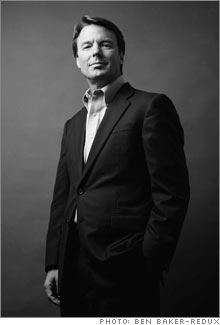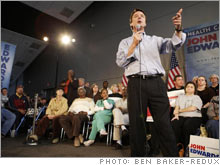(Fortune Magazine) -- No one was paying much attention to John Edwards in February 2006, when a historic contest for control of Congress was getting underway and the 2008 presidential race was still a sliver of light on the horizon. But Danny Glover was. He had to. For three days the Lethal Weapon star and the one-term Senator were glued to each other's sides like a pair of mismatched LAPD cops as they traveled across the country to lend support to hotel workers and their unions on the eve of a threatened strike.
At the time, Glover was the veteran of poverty politics; Edwards was still a rookie in training. So Glover, who prides himself on his ability to sniff out poseurs and users, warily scrutinized the carefully coifed politician from North Carolina. "There's real humility and false humility," Glover says. Which was Edwards?
 |
| Worker's champ: A theme of haves vs. have-nots underlies his campaign for the presidency. |
 |
| Edwards speaking in town hall meeting in January 2007 |
In Boston, he watched Edwards listen to the plight of a single mother, an Italian immigrant who had managed on a hotel maid's pay to raise four children and send each one to college. In Chicago, Edwards took a lesson in the back-breaking work of lifting 113-pound mattresses and changing luxury duvets weighed down by piles of pillows and shams.
In L.A., the former Senator arrived overscheduled and tired, but impressed labor leaders when he readily agreed to squeeze in an extra meeting with a group of kitchen workers on their break.
The rich lawyer with the soft Southern accent bonded comfortably with this unseen servant class. Like a juror on one of Edwards's personal-injury cases, Glover found himself falling under the trial lawyer's spell. As the duo walked into a meeting of 60 African-American community leaders in downtown L.A. to make the case for greater black support of unions, the deal was sealed. "He was able to talk with them, not up to them or down to them," Glover recalls. "Here was a man who sincerely had empathy."
Here was a man, too, who was discovering the key to his second presidential bid. That three-day campaign for the hearts of America's hotel workers was at the center of a broader two-year process that transformed Edwards into the 2008 race's chief proponent of a hotly contentious view - that America's economic salvation lies in millions more Americans paying union dues.
Edwards brings to the contest a core belief that expanding organized labor - which now accounts for just 12 percent of the workforce, down from 20 percent in the early 1980s - is the way to reduce poverty, expand the middle class, narrow the nation's income gap and make globalization less painful.
"The difference between union and non-union is literally the difference between poverty and middle class," Edwards told Fortune. "Hotel workers, restaurant workers, home health workers, hospital workers - at last count there are some 50 million people who work in the service economy. Those jobs aren't going anywhere else. They have to be done in the United States."
Courting the labor vote is standard procedure for Democratic presidential candidates, but Edwards goes well beyond the usual union-friendly rhetoric; he has aggressively lobbied on behalf of legal changes to make it easier for labor to organize. The testimonials have already begun: "I'm 61, and in my lifetime I don't recall any candidate for President who articulated a belief not just that unions are good, but that they are necessary for what ails society," says John Wilhelm, president of the apparel, textile and hospitality workers' union Unite Here.
Edwards has emerged as the counterpoint candidate to those who argue that union costs and inflexibility - witness Detroit - are killing American companies. Which has prompted industry leaders, for their part, to wonder if Edwards, of all the candidates, is the one most hostile to their interests.
"We have nothing against unions, but he would like to take industry down on its knees," says Joseph McInerney, CEO of the American Hotel Lodging Association, who supported the Kerry-Edwards ticket in 2004 but now thinks Edwards has gone too far.
Standing up to corporate America in an era of booming profits, however, may be a well-timed strategy for Edwards in the Democratic primary. Much as he did as a trial lawyer making tens of millions representing the injured against corporate abuse, the shrewd Edwards has figured out how to do well by siding with the little guy. While labor's membership has declined, its determination to wield its political clout has mushroomed over the past decade. In the two most recent elections, union money ranked at the top of independent expenditures, and union leaders tell Fortune they plan to exceed their record-breaking 2004 spending in the current election.
With that as the spark plug, Edwards hopes his other assets - the appeal of his anti-war stance, a formidable campaign organization, and his experience as a presidential candidate - will enable him to surprise all those pundits betting on a two-way race between Hillary Clinton and Barack Obama.
The issues
On an icy white Iowa City day, Edwards is delivering his populist message to a crowd of more than 800 Democrats packed into a university auditorium for a candidate town-hall meeting. Like scores of other events, this one demonstrates that Obama and Clinton aren't the only candidates who can gather and electrify a huge crowd of Democrats.
There are two numbers high on Edwards's mind as this race gets underway: 29 and 21. Howard Dean was at 29 percent - first place - in New Hampshire polls in early January 2004, before the Iowa caucuses. But practically overnight his surprisingly weak third-place showing in Iowa pushed his New Hampshire number down to 21 percent, while Kerry shot past him.
Edwards may be trailing Clinton and Obama nationally, but he knows firsthand that Iowa can be a make-or-break stop for candidates. And as recently as mid-April, Iowa polls were showing him in the lead. Fortunately for Edwards, next year's newly revised calendar slots the Nevada caucus next - an event to be heavily influenced by unionized hotel workers, who adore him. Bottom line: Edwards hopes to sail into New Hampshire on the wings of top-place showings in Iowa and Nevada.
"How about this gentleman with a tie on right here," Edwards says, standing in the center of the Iowa auditorium, holding a mike in one hand, pointing a finger with the other. "I always get nervous when I see a tie on." The twentysomething gentleman turns out to be neither a corporate shill nor a Republican spy, but the kind of questioner who enables Edwards to show off the "frankness niche" he has artfully carved out in the '08 race to distinguish himself from the more cautious front-runner, Clinton. "You've been talking about race and diversity," says Wayne from Iowa City, "and I was wondering what you had planned to pursue rights for gays and lesbians."
"The real question, which you didn't ask because you were being nice," Edwards says, drawing out the pronunciation of "nice" as the Carolinian nahhs, "is my position on gay marriage. This is, for me, a very difficult issue personally because of the place I come from, my own faith tradition, growing up in the rural South. I feel internal conflict about this, just so you know. I don't feel any righteousness. But where I am today is for civil unions and substantive rights." That would be a no for gay marriage, and yet the liberal audience offers robust applause.
Like Edwards's oft-repeated apology for his 2002 Senate vote to authorize the Iraq war, this frankness resonates with Democrats who felt used in 2004, throwing their support to a candidate who fitfully flopped rightward. After watching John Kerry's hairsplitting answers up close, Edwards is building a left-leaning version of John McCain's 2000 "straight talk express," looking voters in the eye and offering answers they don't always want to hear.